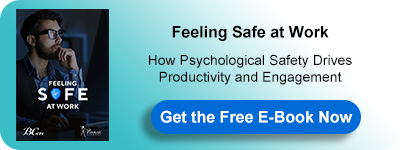Key Insights on Psychological Safety
Many studies have been carried out to measure the relationship between psychological safety and workplace effectiveness. Studies were conducted in diverse organizational and industrial contexts across multiple countries and regions including United States and Taiwan. Studies have greatly supported the idea that psychological safety is vital for workplace effectiveness. Some of the interesting findings of these studies include:1
There is a strong link between psychological safety and effective performance.
Effective performance requires employees and managers to accept mistakes and encourage taking risks. In order for employees to achieve more they must feel safe to express their opinions and to make mistakes. When employees feel safe they can engage in productive dialogue with their team members. Therefore, they behave more effectively individually and within teams as they accept and give constructive criticism.
Psychological safety is important for understanding organizational learning.
According to Peter M. Senge, a learning organization is a place, in which people “continuously deploy their capabilities, fulfill their true targets, in which new ways of thinking are supported and new common hopes are delivered.2 During the process of learning within organizations, feelings of fear of not achieving one’s goals along with learning anxiety that is a result of not feeling incompetent during learning may stop people from expressing themselves. Therefore, creating a psychologically safe environment can lower these risks in learning hierarchies. As a result, employees are more likely to offer ideas, admit mistakes, ask for help or provide feedback. This results in an increase in collaborative relationships within the organization and thus an increase in the learning performance of the organization.
Studies have also shown that individuals who experience greater psychological safety are more likely to speak up at work.
Employees need to have the ability and willingness to speak up their problems, concerns and ideas to those who occupy positions. Employees can help challenge the status quo, identify problems or opportunities for improvement, and offer ideas to improve their organization’s wellbeing. Studies have shown that employees usually find it difficult to do so. Therefore, providing a psychologically safe environment can help lessen this risk.
1Psychological Safety: The History, Renaissance, and Future of an Interpersonal Construct, Znike Lei, March 2014
2The Fifth Discipline, Peter M. Senge, 2004
For more about this topic, download our latest book "Feeling Safe at Work" for FREE:
